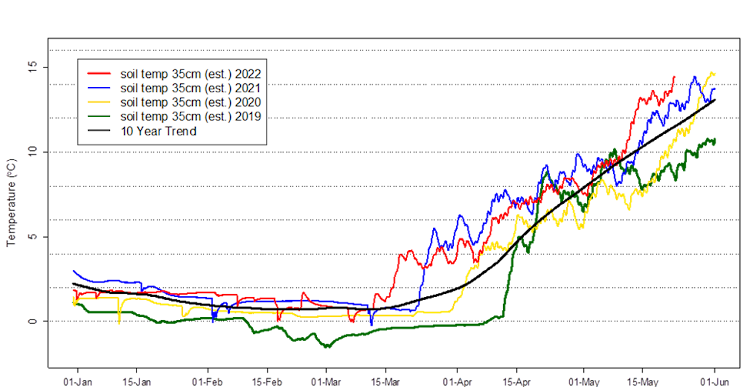I hope you all had a great long weekend!
This is the last update on Monilinia blight for this season, but I will continue to share things through the season.
There are three things I want to share in this post:
Another frost advisory
for the province
Monilinia blight
infection symptoms from this year
Rainfall amount and
soil temperatures in NS 2022
Another frost advisory for the province
There is another frost advisory issued for the province, please visit this link for more details: https://weather.gc.ca/warnings/index_e.html?prov=ns. Minimum temperatures: zero to plus 6 (coolest in low lying areas).
Are you wondering if
the temperatures will damage wild blueberry blooms? Please read our 8th
update about this topic: http://www.novascotiawildblueberryblog.com/2022/05/8th-blight-update-and-seasonal-outlook.html.
Monilinia blight infection symptoms from this year
As I mentioned last week, we are expecting to see monilinia blight symptoms this week and we have something to share!
We observed symptoms on both leaves
and flowers (Figure 1) from a field in Greenfield (near Truro). By looking at
those infected stems, the primary infection occurred around 2 weeks ago.
Figure 1. Infected stems (photo credit: Sarah Schaefer, Perennia)
I haven’t received any reports and information
from growers about this year’s monilinia infection, but this could be a low
infection year because of the weather we had during infection periods. I
encourage you to take a look at your fields and please share if you notice anything
would concern you.
Rainfall amount and soil temperatures in NS 2022
This information was received this morning and data were generated by Jeff Franklin (AAFC Kentville; thank you, Jeff).
From May 1 to May 24, we received only 26.5 mm of rain (Kentville weather station). This is lower than the 10-year average of 69.3 mm (for the entire month of May). In 2021, we had 106.0mm of rain in May. This drier condition potentially reduces monilinia infection risk in May for this season but it is getting too dry and we need more moisture for blueberry plants as well as other crop sectors in the province.
On the soil temperature side, we
are well ahead of the 10-year average and 2021 temperature (Figure 2). Soil
temperature and plant development are strongly related. We are seeing fast
plant development from bud stages to bloom in early May and the soil temperature
plays an important role to cause this for the season. As I mentioned previously
about rainfall amount, the drier condition is an important factor resulting in
higher soil temperatures.
This is an interesting season and we just need to watch closely as the season progress.
Figure 2.
Average soil temperatures in NS (Jeff Franklin, AAFC Kentville)


